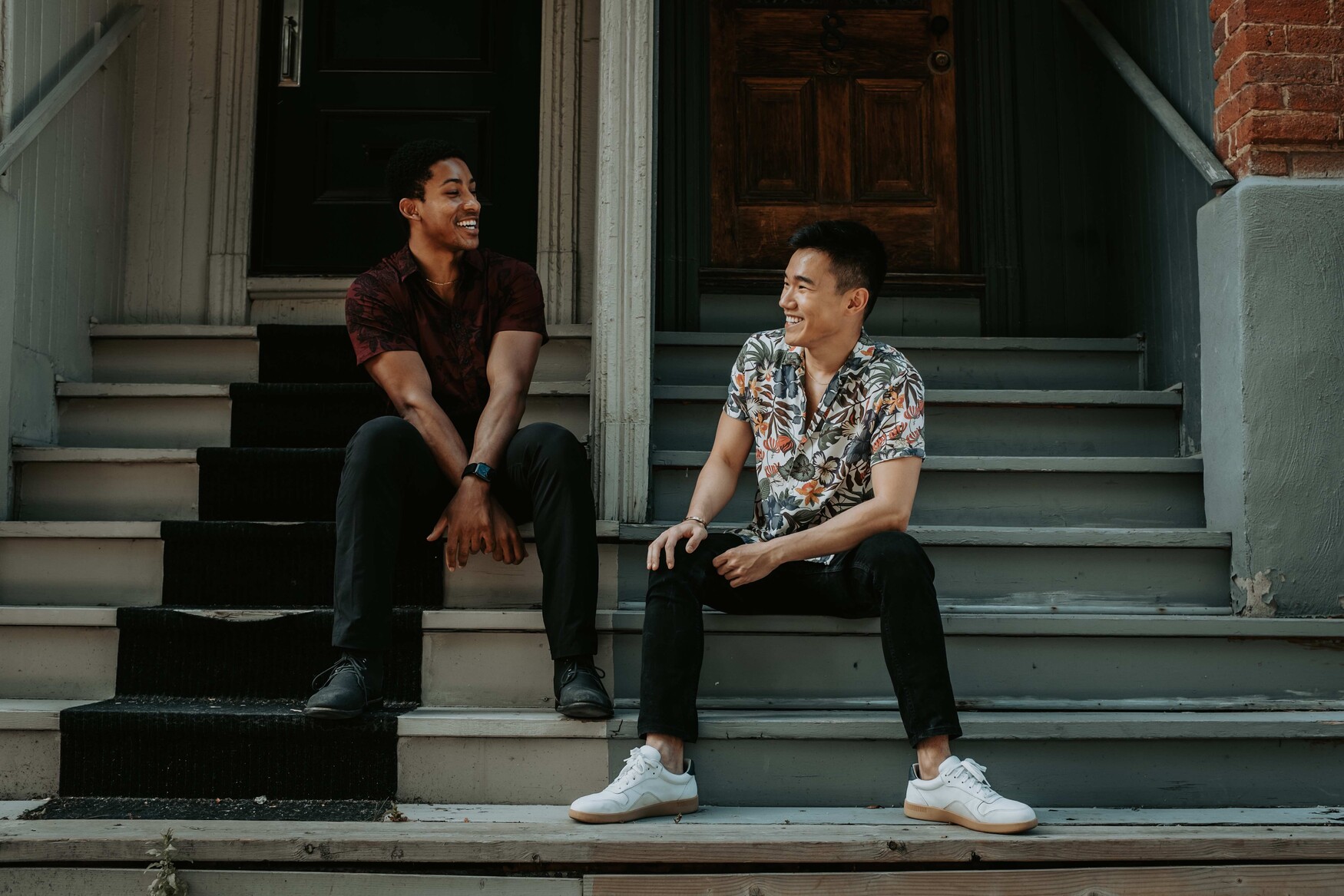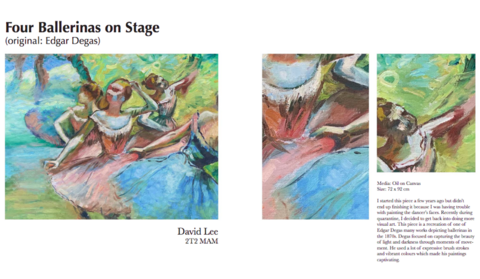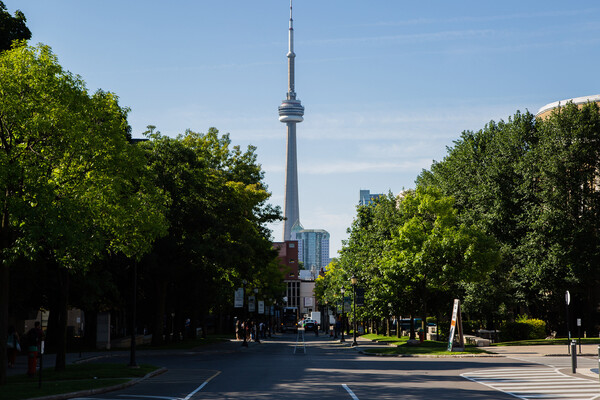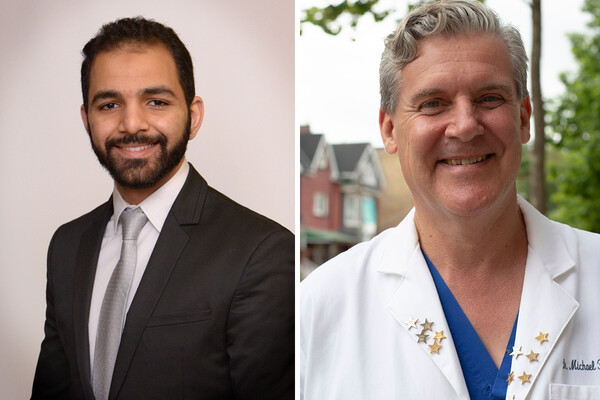Breadcrumbs
- Home
- MD/PhD Program
- News
- U of T Medicine's David Lee & Kristian McCarthy on LGBTQ+ Health, Pride Month and Advocacy
U of T Medicine's David Lee & Kristian McCarthy on LGBTQ+ Health, Pride Month and Advocacy

Julia Soudat

Did you always want to be a physician? What inspired you to pursue medicine?
David: I think that physicians play a pivotal and unique role in addressing health inequities. I’ve always been interested in using innovation as a solution to systemic inequities. Currently, I am pursuing a concurrent M.Eng degree and have learnt how to integrate skills from both fields in order to provide better mental health care for Toronto's queer community.
Kristian: From a young age, I knew that medicine was my dream career. Since my mother is a dentist, and my father was diagnosed with Multiple Sclerosis before I was born, I was continuously surrounded by healthcare workers growing up. These individuals were not only brilliant but were incredibly encouraging and compassionate. They advocated for my father’s needs and during the worst of times, they gave us hope. To practice in a field where I can help families and participate in advocacy is everything I've ever dreamed of.
Why did you decide to join Out in Medicine?
Kristian: I find immense value in using the privileged position of being a medical student to advocate for underserved populations. Heading into medical school, I was unsure of what the formal LGBTQ+ health and healthcare curriculum would look like. When Out in Medicine presented itself as an opportunity, I was very eager to join. Being both gay and Black, I can identify with the demoralizing feeling of being “the other.” So being part of a group where students like me (and allies) can come together and learn in a safe space is very rewarding.
David: As I became more open about my sexual identity, I began to recognize the unique position that LGBTQ+ medical students have in advocating for our own communities. Historically, medicine has not been the most welcoming to queer identities and there are still disparities in the health care LGBTQ+ individuals receive. Out in Medicine was an opportunity to amplify those concerns and address those changes in our own curriculum and in medical education.
Why is it important to be intentional in addressing LGBTQ+ issues in medicine?
Kristian: LGBTQ+ individuals are affected by a variety of unique social, structural, and behavioral factors which result in this population facing a disproportionately high burden of disease. An array of reasons have been proposed to explain this discordance. Some include previous misuse of chosen names or pronouns, financial constraints, lack of physician knowledge related to LGBTQ+ health and physician stigma towards certain sexual acts.
It's incredibly important to educate medical students on these inequities and ensure that future doctors are receiving the necessary training to prevent the perpetuation of health inequities for the LGBTQ+ community.
What initiatives have you been involved in and what's coming up next?
Kristian: Throughout the year, Out in Medicine holds many social events to create a safe space for queer medical students and allies. During the 2019-2020 academic year we had the privilege of presenting at the Lead with Pride annual conference. This was an LGBTQ+ student leadership event presented to undergraduate University of Toronto students in which we discussed how to find physicians that are LGBTQ+ friendly, as well as how to successfully navigate the healthcare system as queer-identifying individuals.
When COVID forced us to cancel our annual conference, we were incredibly grateful that many of our speakers agreed to present at a virtual version of this event. This virtual Queering Healthcare conference was an afternoon focused on how individuals experience accessing or providing care within the LGBTQ+ community, the barriers that they face to do so, and the interprofessional landscape involved in queer health today.
David: Apart from the initiatives Kristian mentioned, another priority this year for Out in Medicine was to increase our outreach to the diverse LGBTQ+ community in Toronto. Prior to the pandemic, we had programming arranged in partnership with AIDS Community Toronto (ACT) to have medical students volunteer at their anonymous HIV testing clinics. We were reaching out to local physicians working in LGBTQ+ communities for shadowing opportunities for medical students. We also tried to establish is a national organization composed of all Canadian LGBTQ+ medical student groups. We look forward to animating these initiatives in the future!
How can LGBTQ+ patients advocate for themselves?
David: While it isn’t the responsibility of a patient to educate healthcare providers in appropriate care, self-advocacy strategies can be useful in ensuring that your needs are met and understood. Some of the strategies we proposed are sharing your emotional and physical concerns at the start of the appointment. If you wish, you can ask a friend or relative to accompany you to the visit. If the healthcare provider can’t answer your questions or provide you with services, ask for a referral to a doctor who can do so.
How can people find physicians that are LGBTQ+ friendly?
Kristian: For Ontario residents, the best way to find a physician that is LGBTQ+ friendly would be to visit Rainbow Health Ontario. They list providers/programs that have expressed a commitment to providing welcoming and knowledgeable care to LGBTQ+ across Ontario.
For those who live outside of Ontario, or those who currently have a family physician and are hesitant to disclose their sexuality/gender identity with them, we suggest patients assess the space in which they receive health care for demonstrations of their provider’s openness to accepting LGBTQ+ patients. This would include rainbow flags or other LGBTQ+ friendly symbols in their office, intake forms that are written in inclusive/open language, and having their practice listed in directories on local LGBTQ+ organization websites.
What kind of changes do you think are necessary in medicine to improve LGBTQ+ health care and outcomes?
Kristian: It is incredibly important to not only dismantle our own implicit biases against LGBTQ+ individuals, but to target systemic prejudice and discrimination.
For example, we are often taught a broad array of heteronormative ideals – the belief, predicated on the gender binary, that the “normal” way to engage in sexual and romantic relationships is to be heterosexual, often erasing other possibilities. By having this lens in place from a young age, anything that deviates from this becomes seen as “abnormal." This has materialized in medicine as banning blood donation based on sexual identity rather than sexual activity, intake forms that only allow for male and female gender identification, LGBTQ+ health only being taught in lectures about sexually transmitted infections, and much more. Medicine has come a long way in addressing issues like this, but as future doctors, it is our job to continue questioning these things and demanding that those in leadership roles do the same.
David: I think for change to be effective, there needs to be better quality information regarding the struggles and issues that LGBTQ+ individuals face. When LGBTQ+ health data is available, the experiences that LGBTQ+ individuals face are often generalized together and fail to recognize each individual’s unique story and lived experience. In other cases, marginalized identities under the LGBTQ+ umbrella are often overlooked. Some of these are: two spirit, bisexual, pansexual, asexual and many other intersecting identities. When we focus on data collection and interventions, we need to use an intersectional lens that reflects the diversity of the LGBTQ+ community.
For a lot of people, Pride Month is looking very different this year. How will you be celebrating?
David: My best friends and I have a tradition of celebrating Pride and watching the parade together. This year, we’re going to try and attend virtual Pride together. Out in Medicine also has our annual Scrub Tie Dye during Pride month. We’ve really tried to adapt our programming to an online format. We’ve been having an event every week this month: Queer History Trivia, SpeakOut: Open Mic, and a Moonlight Screening with the Division of Medicine.
More than ever, it’s important to recognize the roots of Pride as a resistance, similar to the Black Lives Matter movement. As we celebrate this month, we are reminded that Pride was catalyzed because of the courage of Black and Brown trans and queer folk.
Outside of being medical students and advocates, what do you like to spend your time on?
Kristian: During quarantine I have spent quite a lot of time caring for my plethora of houseplants! I also really enjoy biking around the city and finding different avenues to stay fit while the gyms are closed.
David: I’ve done a lot of visual arts and graphic design during quarantine. I’m starting to relearn all the painting skills that I’ve forgotten! Below is a piece that I submitted to Palette Magazine, I’ve been working on for a while but only had a chance to finish during quarantine.

News


